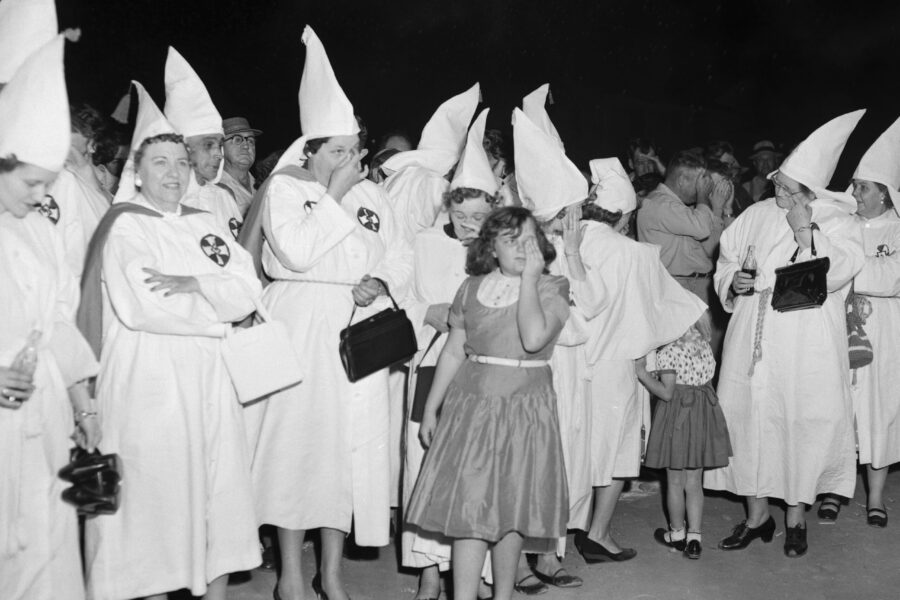Followers of this blog may be aware that I was born and raised in Georgia.
In 1949 my parents, my older brother and I moved from the small town of East Point, a blue collar community populated by salt of the earth people, to the more prosperous north side of Atlanta. The reason for the move had nothing to do with a desire for upward social mobility.
My mother was Catholic and my father a Protestant. In 1939, when they were married in a Catholic ceremony, my father was actually required to sign a pledge that any offspring of the union would be raised Catholic.
East Point was overwhelmingly populated by Southern Baptists many of whom viewed Catholics with suspicion, fear, and sometimes outright hate.
Here’s an example of what I’m talking about.
One sunny day in 1948, my mother, a true Southerner who was unfailingly kind and polite to everyone, was hanging out the wash on the clothesline behind our East Point home, when she was approached by the grandmother of the family next door. According to my mother, their conversation went something like this:
Grandmother: “Mrs. Parry, would you be interested in joining our ladies’ auxiliary? We do charitable work in the community and promote Americanism and Christian values.”
My mother: “Why thank you so much for the invitation! You’re too kind! What is the name of your organization?”
Grandmother (proudly): “Why it’s the ladies auxiliary of the Ku Klux Klan!”
My mother: “How nice! I’m so flattered that you would ask me to join! But I must tell you that I’m Catholic. Would that be a problem?”
The old lady never answered. She jumped back like she had just seen a vampire getting ready to bite. In fact, she never spoke to any of us again.
My mother, God bless her, would laugh every time she told that story. She thought the whole ridiculous encounter was a total hoot.
Anyhow, back to the reason for moving to Atlanta.
There were no nearby Catholic schools in East Point. But my parents found a house in Atlanta two blocks from the Cathedral of Christ the King which had a Catholic elementary school. My father, a man of his word, wanted to honor his pledge to raise his children Catholic. So they moved to Atlanta and enrolled my brother and me in that school.
My brother became an instant academic star and the nuns’ all-time favorite student. I followed him there, and, for all eight years of my sentence, the nuns – when they weren’t whacking me over the head – would repeatedly ask, “Are you sure you’re Richard Parry’s brother?”
So that was how I came to grow up in Atlanta.
Back then, Atlanta’s public schools, restaurants, hotels, buses, cabs and just about everything else were racially segregated. In buildings with elevators, only whites were allowed to use them. Black people had to take the stairs or the freight elevator. Public restrooms were segregated, and where there were water fountains, there would be one with no designation and another marked “colored”.
Things began to change in the late 1950s with the court-ordered integration of Atlanta’s public schools.
That was the beginning, and today the scourge of racial segregation has been erased throughout the state. And Atlanta and its environs in Fulton County have a near majority black population which dominates local politics.
I left Atlanta in 1962 to attend Georgetown University in Washington, D.C. It was there that I met and married my wife of 56 years, a real New England Yankee (!) from Rhode Island. Since then we have lived up North.
From time to time I visit my brother and old friends in Atlanta, but the place is barely recognizable. When I left home, it was a growing but relatively small and beautiful city where the people were friendly and life was leisurely and gracious. It has grown to become a gigantic crime-ridden, hectic, traffic-clogged hell hole – a victim of its own success.
All that by way of explaining why I am so fascinated by the phenomenon of Fani Willis, the elected radical Fulton County District Attorney, and her history-making and totally bizarre RICO indictment of President Trump and 18 others for daring to challenge the outcome of the 2020 election in Georgia.
How times have changed in my old hometown.
Anyhow, here’s my latest article about that indictment which was published yesterday by The American Spectator.
Night Falls on Georgia – The American Spectator | USA News and Politics

Lost in the media frenzy surrounding the pre-trial maneuvering in Fulton County District Attorney Fani Willis’ RICO case against former President Donald Trump and 18 others is any discussion of what actually happened in the conduct of the 2020 election in Georgia.
The centerpiece of Willis’ case is an hour-long conference call in which Trump told Georgia Secretary of State Brad Raffensperger, “What I want to do is this. I just want to find, uh, 11,780 votes, which is one more than we have, because we won the state.”
Note that Trump did not say that Raffensperger should manufacture or alter votes. Instead, he was making a statement of fact as to his desire. This was no invitation to commit fraud or to illegally change the outcome of the election.
There was a time — back before the installation of radical Marxist prosecutors across America — that Trump’s statement would have been recognized as petitioning the government for a redress of grievances. As such, it would have been considered speech protected by the First Amendment to the Constitution.(READ MORE: The Magical Thinking of Never Trump)
But that was then. Now, committed radicals like Willis and Special Counsel Jack Smith no longer feel constrained by either the Constitution, statutory law, or legal precedent. The law is whatever they say it is, and they have the power to enforce it.
So what was Trump talking about? Did he have some factual basis for his statement to Raffensperger?
He most certainly did. Consider, for example, the findings of True the Vote, a public interest organization committed to stopping voter fraud.
On Aug. 21, 2023, True the Vote issued its report on the conduct of the 2020 Georgia election. True the Vote found that “it appears that 67,284 votes were cast from ineligible voter registrations based on invalid residency. 19,077 votes were assigned to records of voters who no longer lived in Georgia. 48,207 votes are assigned to voters who had moved to a different county within Georgia.”
True the Vote also found that the state of Georgia mailed ballots to 16,986 addresses where voters no longer lived, yet the votes were still cast and counted. 8,984 of these votes were assigned to inactive voter registration records.
So who cast these ballots, and how did this mess occur?
The report states that, in a December 2020 meeting with True the Vote’s founder, Catherine Engelbrecht, Raffensperger admitted that Georgia’s voter rolls had not been “cleaned” in the two years before the election.
At the meeting, Engelbrecht told Raffensperger that True the Vote was preparing to challenge a whopping 364,000 ineligible voter records.
Was Raffensperger alarmed? Embarrassed? Defensive? Apparently not. The report quotes him as saying, “That seems about right. The GOP should have been doing this [raising challenges] all along.”
But what was his excuse for not doing his job and keeping those records in proper order?
According to the report, Raffensperger advised that in 2019 unsuccessful Democrat gubernatorial candidate Stacey Abrams and an organization called “Fair Fight” had sued Georgia to prevent voter roll maintenance. They alleged that such roll cleaning was “erroneous” and — wait for it — racially biased. Although the state won that lawsuit in 2021, while it was pending from 2019 through 2020, Raffensperger “acquiesced to Abrams” and took no action to remedy the situation.
True the Vote’s report asserts that “mail ballots, drop boxes, no ID requirements, no monitoring [were] all catalyzed by inaccurate voter records.… Georgia’s lack of voter roll maintenance, together with rules that lowered identification standards for mail-in and inactive records, created an expressway for fraud.”
In January 2021, Georgia held a Senate runoff election prior to which True the Vote worked with citizens across Georgia to file voter record challenges. And guess what? Stacey Abrams, Democrat lawyer Marc Elias, and Fair Fight sued True the Vote alleging “racism and voter intimidation.” Elias also sent letters to every one of Georgia’s 159 counties threatening legal action if they used True the Vote’s information to improve voter roll accuracy.
The intimidation worked. Only two counties coordinated with True the Vote to clean up their voter rolls. For that, they were sued, but ultimately vindicated in court.
But, according to True the Vote’s report, the state of Georgia did not come to their aid. If Raffensperger knew the rolls were inaccurate, why didn’t the state help those two counties and all the others stand up to Elias’ threats?
Fair Fight has sued True the Vote for its work in supporting elector challenges. Since the State of Georgia had “pre-cleared” True the Vote’s plan to clean up the voter rolls, why hasn’t it intervened in the case on behalf of True the Vote?
Well, here’s a subtle clue. The state of Georgia has sued True the Vote over its findings related to the use of “drop boxes” and has demanded that True the Vote produce “data they [the state] already have in their possession but choose to keep covered up.”
Get the picture?
True the Vote’s report concludes, “There are no good answers in Georgia. Either they don’t know what they are doing. Or they do.”
So there’s the background and context of Trump’s call to Raffensperger. And that’s the election that Trump and his codefendants challenged.
Faced with that evidence of official misfeasance, nonfeasance, and malfeasance coupled with the tens of thousands of ballots cast by ineligible voters, Willis’ task of proving beyond a reasonable doubt that Trump and his codefendants had no legitimate basis for challenging the 2020 Georgia election would, in any honest legal system, be all but impossible. In fact, no serious prosecutor committed to the rule of law would even consider bringing charges.
But, as noted, we are now in a new era of radical prosecutors for whom the facts and the law are but minor inconveniences. For them, no such bourgeois concepts as truth and the rule of law will get in the way of using their naked power to — in the immortal words of candidate Barack Obama — “fundamentally transform America.”
George Parry is a former federal and state prosecutor. He blogs at knowledgeisgood.net.




6 Comments
Leave your reply.